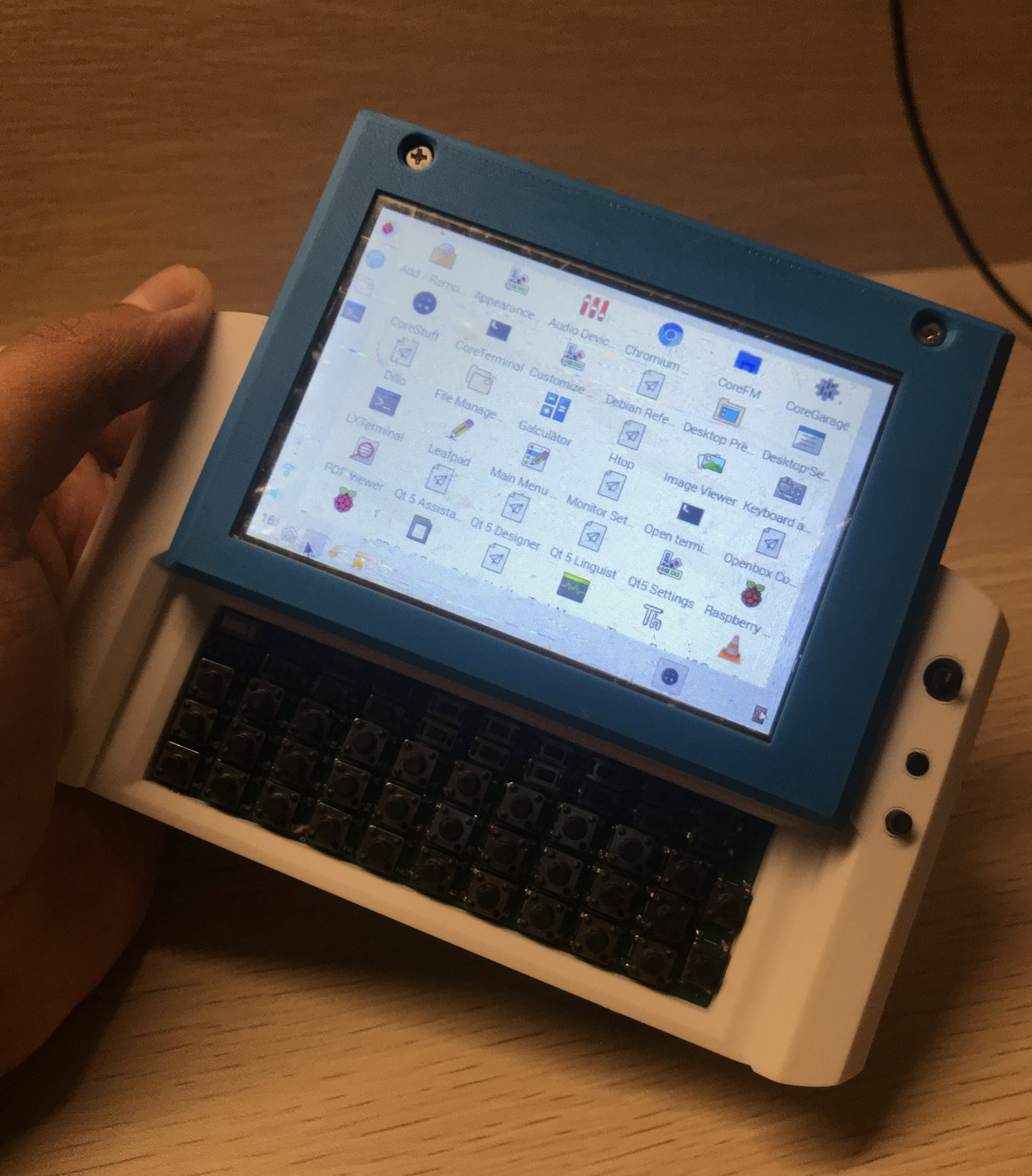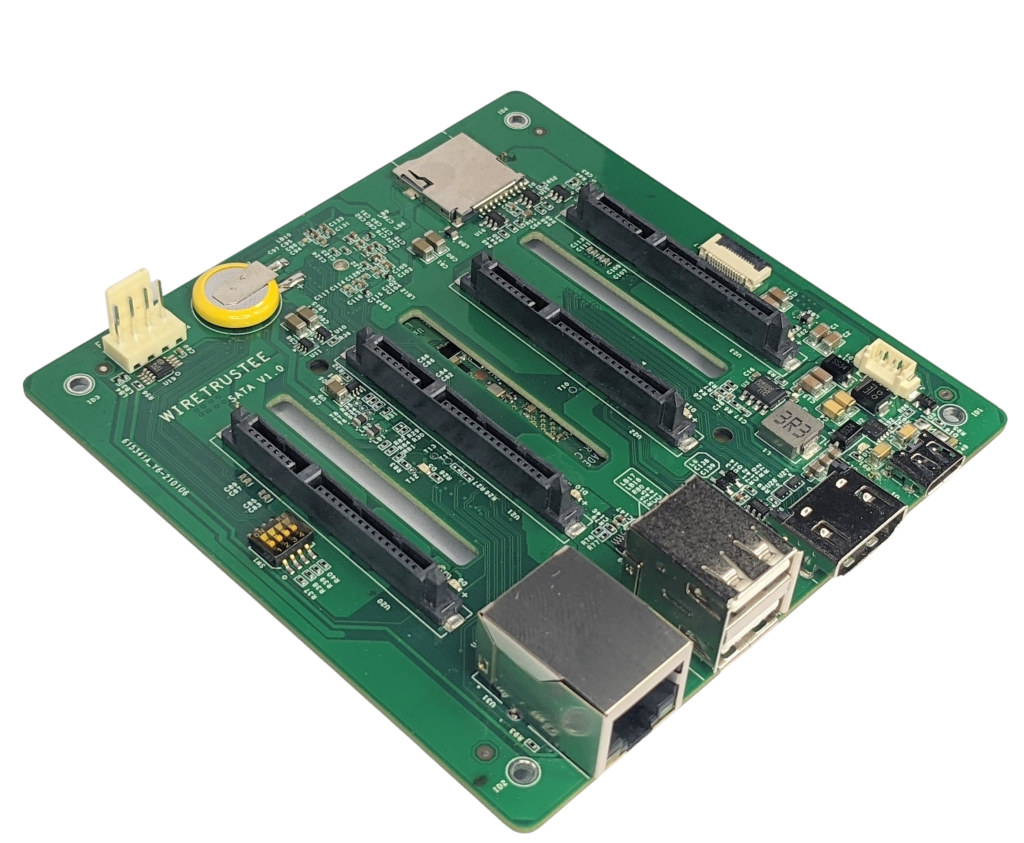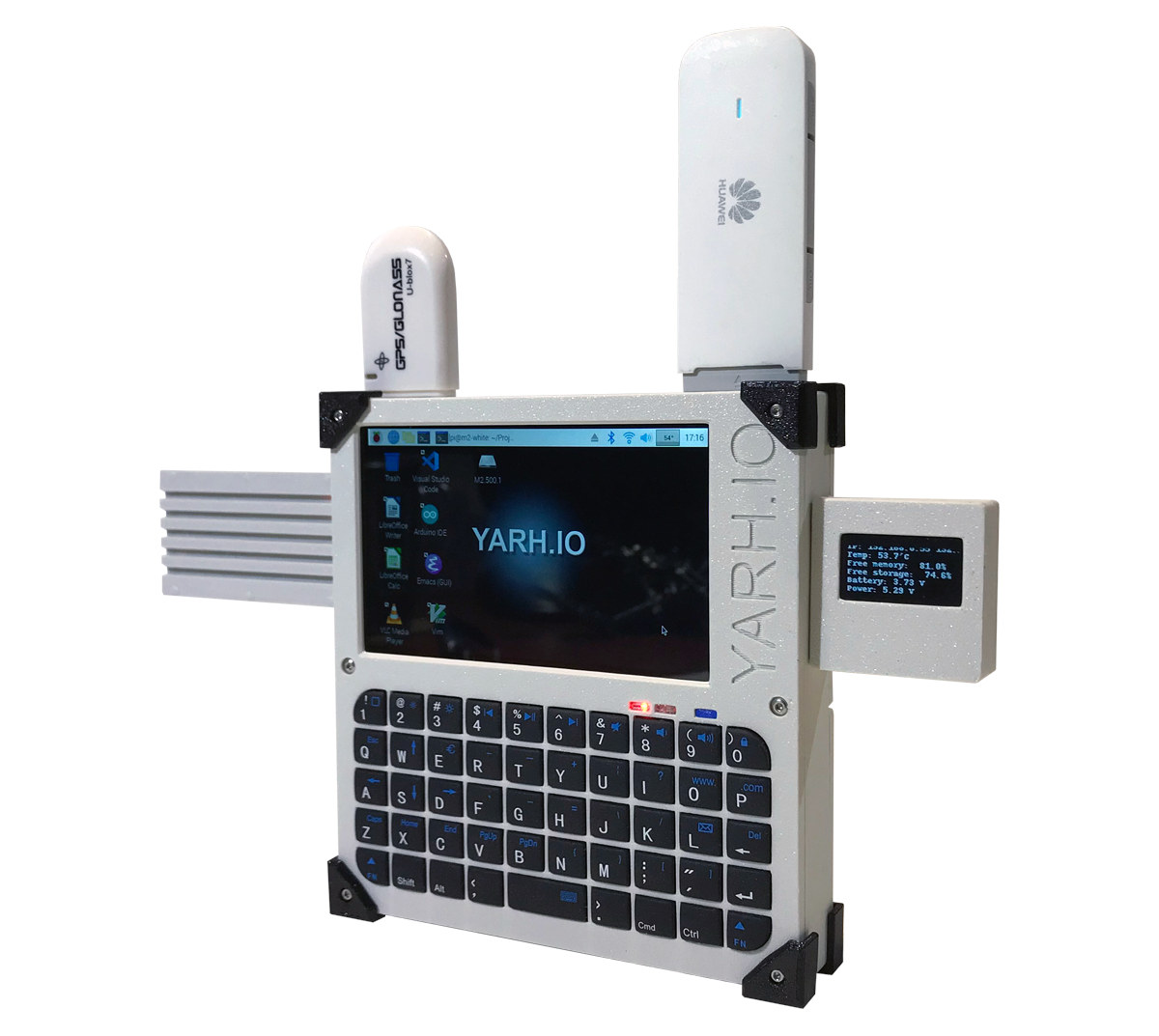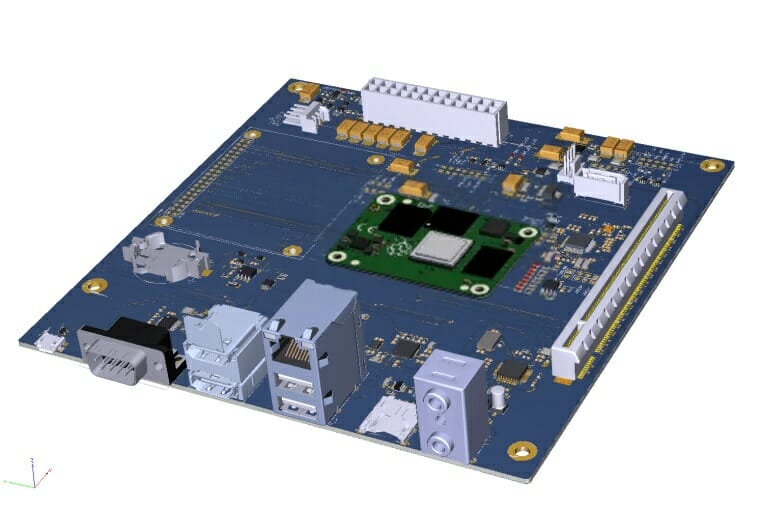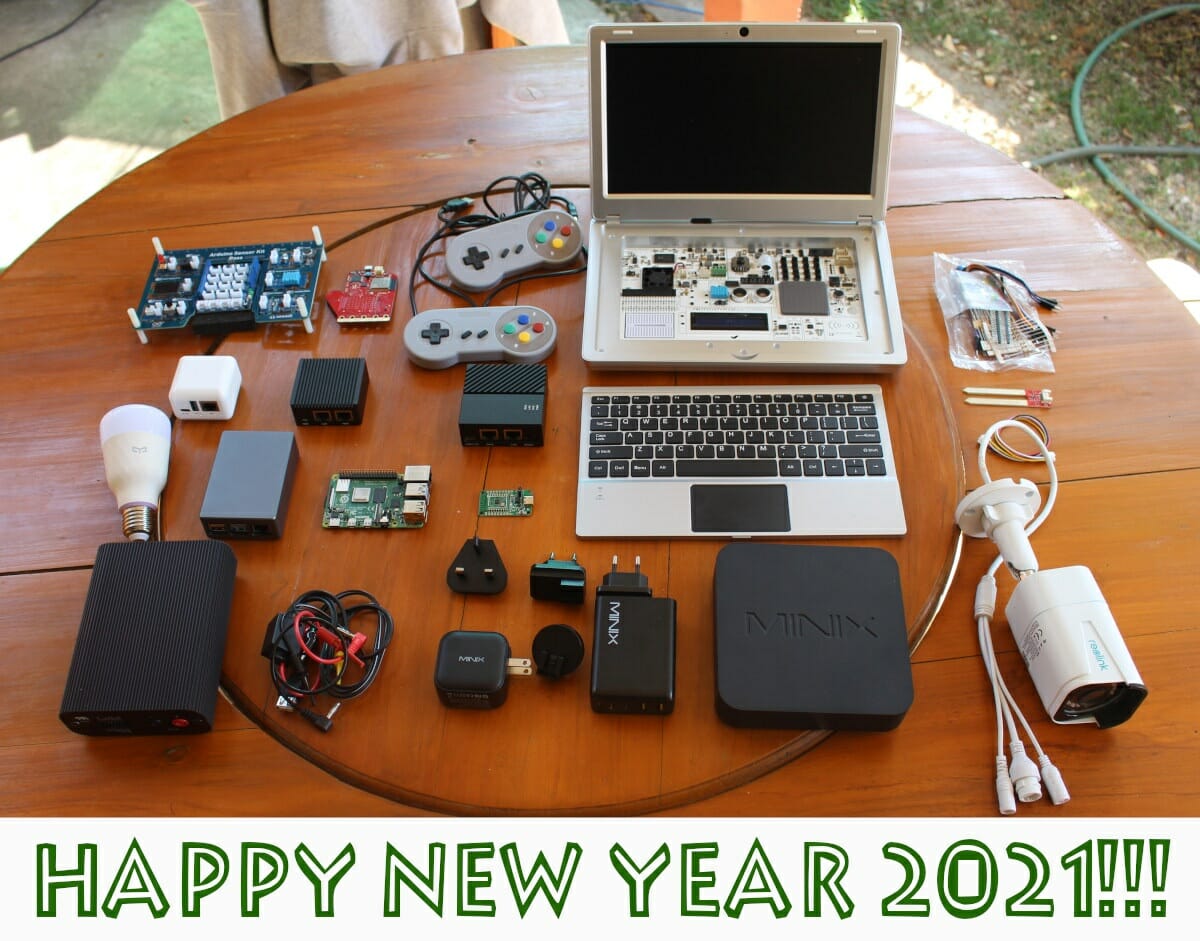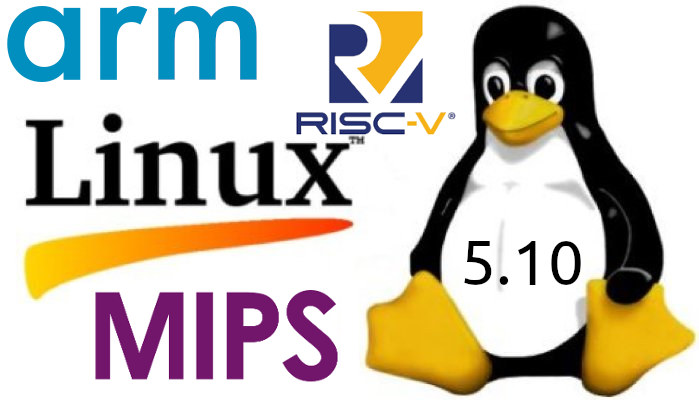FOSDEM 2021 open-source developer event will take place online later this week, and yesterday we compiled a list of talks, with one entitled “MutantC PDA introduction – open source and hardware PDA shell” piquing my interest. The talk will be about the third revision of the hardware which allows you to create your own UMPC or handheld computer powered by a Raspberry Pi SBC or other compatible single board computers including Asus Tinker Board S, PINE H64 Model B, Banana Pi BPI-M4B, among others. MutantC v3 is versatile and highly customizable as can be seen from the specifications highlights: Supported SBCs – Raspberry Pi Zero, 2, 3, 4 and compatible. Arduino for keyboard – SparkFun Pro Micro 5v/16Mhz or SparkFun Qwiic Pro Micro – USB-C Display – 2.8-inch, 3.5-inch, or 4-inch “GPIO” LCD such as AdaFruit PiTFT 480×320 display Custom PCBs for display, mainboard, and thumbstick Expansion External 12-pin “docking” […]
Build a Raspberry Pi CM4 4-Bay NAS with Wiretrustee Carrier board
Broadcom BCM2711 processor comes with a PCIe interface that is used for the USB ports on the Raspberry Pi 4 SBC, but that is exposed through the board-to-board connectors of Raspberry Pi Compute Module 4, aka Raspberry Pi CM4, and allows all sort of designs. So far we’ve mostly seen this PCIe interface used for M.2 expansion slots on devices ranging from industrial computers to carrier board such as Piunora or Gumstix Raspberry Pi CM4 development board. But Wiretrustee had a different idea and designed carrier board with Marvell 88SE9215 PCIe to SATA controller and offering four SATA connectors to build a 4-bay NAS with Raspberry Pi CM4 module. Wiretrustee carrier board specifications: Supported SoM – Raspberry Pi Compute Module 4 and 4 Lite Storage 4x SATA 2.0 via Marvell 88SE9215 (PCIe 2.0 x1 to 4 6Gb/s SATA ports, no HW RAID) chip tested at a write speed of ~220MB/s […]
ClusBerry 9500-CM4 – A Raspberry Pi CM4 cluster, industrial style
Raspberry Pi cluster boards / solutions pop-up from time to time. But so far, I think we’ve seen only one based on Raspberry Pi CM4 modules with the upcoming Turing Pi 2 mini-ITX cluster board supporting four of those. TECHBASE has now unveiled a different kind of Raspberry Pi CM4 cluster with ClusBerry 9500-CM4 integrating up to eight Raspberry Pi Computer Module 4 in a DIN-Rail housing for industrial applications. ClusBerry 9500-CM4 is designed to be customizable with a choice of Raspberry Pi CM4 based modules and I/O cards: Standard 9500-CM4 cluster module with Compute Module 4 and a selection of configuration that include: I/O Controller with DI, DO, AI, 1-Wire, RS-232/485 and CAN interfaces Communication Gateway with up to 2x Ethernet, serial ports, wireless connectivity: LTE-cat.M1, 4G, 5G, LoRa, ZigBee, Z-Wave, Wireless M-Bus AI Gateway with Coral Edge TPU via PCIe M.2, or up to 4x Coral Edge TPU […]
Stripped-down Raspberry Pi 3B+ SBC powers YARH.IO Micro 2 DIY handheld PC
We’ve already seen a few DIY Raspberry Pi-based handheld computers in the past with the likes of Zero Terminal V3 or hgTerm powered by a Raspberry Pi Zero and a stripped-down Raspberry Pi 3 board respectively. So why not another? YARH.IO Micro 2 DIY handheld PC is based on a Raspberry Pi 3B+ SBC stripped from its Ethernet port, whose double stack USB connectors have been replaced with single stack USB connectors. The DIY computer also adds off-the-shelf parts with a 4″ touch screen display and a Bluetooth keyboard without touchpad, and gets its power from a 3,500 mAh battery. YARH.IO Micro 2 key components and features: SBC – Stripped-down Raspberry Pi 3B+ SBC Display – HyperPixel 4.0 4-inch IPS display with 800×480 resolution, touchscreen from Pimoroni Keyboard – 49-key mini keyboard with Bluetooth 3.0 ($10) USB – USB straight and right-angle connectors for four USB ports around the device […]
Raspberry Pi 4 Mini-ITX carrier board. Meet Over:Board (Crowdfunding)
While the Raspberry Pi 4 SBC is popular for its small form factor, affordable hardware, and good software support, the Raspberry Pi Compute Module 4 offers more flexibility and allows makers and companies to design their own hardware matching their requirements, while still leveraging the existing software support. We’ve already seen a mini-ITX carrier board for the Raspberry Pi 4, namely the upcoming Turing Pi 2. However, the board has very specific use cases in mind since it’s a cluster board designed for four Raspberry Pi Compute Modules 4. But British engineer Ross Nicholls has designed Over:Board carrier board for Raspberry Pi Compute Module 4 for most traditional use cases, in essence, designing what amounts to a Raspberry Pi 4 mini-ITX motherboard with SATA, PCIe, etc. Over:Board specifications: Compatible SoM’s – Raspberry Pi CM4 or CM4Lite with Broadcom BCM2711 quad-core Cortex-A72 processor, up to 8GB RAM, up to 32GB storage. […]
Open-source VSCP IoT/M2M automation framework supports Arduino, Raspberry Pi
VSCP (Very Simple Control Protocol) is an open-source IoT framework that works on development boards like Arduino or Raspberry Pi, and lets you control IoT home automation tasks. The framework is highly scalable, has a very low footprint, and as such is specially designed for resource-limited devices. VSCP is an open-source standard protocol for m2m, IoT and other remote control and measurement applications. It enables simple, low-cost devices to be networked together with high-end computers and/or to work as an autonomous system, whatever the communication media is. The VSCP Protocol has two levels: Level 1 and Level 2. The protocol was primarily used in CAN networks (that is Level 1 for tiny microcontrollers) because CAN is cheap and reliable with high efficiency. However, VSCP can be used for faster transport layers such as TCP/IP, so here comes Level 2 which achieves better performance. We have already seen Souliss, an open-source […]
Year 2020 in review – Top ten posts and stats
It’s this time of the year when we look back at what happened, and what may be next. 2020 did not pan out as planned in more ways than one, but there were still some interesting developments. Based on 2019 announcements, 2020 was promising to be an exciting year for Amlogic and Rockchip with the expected launch of RK3588 and S908X high-end processors for 8K capable devices, but we’ll have to wait for 2021 for this to happen. Instead, the most interesting processor of the year from the Allwinner, Amlogic, and Rockchip offerings was probably Amlogic S905X4 processing adding AV1 hardware decoding. As pointed out in our “RISC-V 2020 highlights” post, it was a fairly eventful year for RISC-V architecture, although there’s still a long road ahead, especially for application processors. We had seen some general-purpose and Bluetooth RISC-V MCUs in 2019, but 2020 saw the launch of the first […]
Linux 5.10 LTS release – Main changes, Arm, MIPS and RISC-V architectures
Linus Torvalds has just released Linux 5.10: Ok, here it is – 5.10 is tagged and pushed out. I pretty much always wish that the last week was even calmer than it was, and that’s true here too. There’s a fair amount of fixes in here, including a few last-minute reverts for things that didn’t get fixed, but nothing makes me go “we need another week”. Things look fairly normal. It’s mostly drivers – as it should be – with a smattering of fixes all over: networking, architectures, filesystems, tooling.. The shortlog is appended, and scanning it gives a good idea of what kind of things are there. Nothing that looks scary: most of the patches are very small, and the biggest one is fixing pin mapping definitions for a pincontrol driver. This also obviously means that the merge window for 5.11 will start tomorrow. I already have a couple […]


